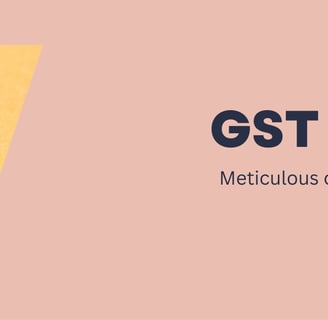GST Compliance Tips
Staying compliant with Goods and Services Tax (GST) regulations is crucial for businesses in India. Here are some GST compliance tips to help ensure smooth operations:
1. Timely Filing of Returns:
- File your GST returns on time to avoid penalties and interest. Set up reminders for filing deadlines to ensure compliance.
2. Accurate Classification of Goods and Services:
- Clearly understand the Harmonized System of Nomenclature (HSN) codes for goods and Services Accounting Code (SAC) for services to ensure accurate classification, as this determines the applicable GST rates.
3. Proper Documentation:
- Maintain detailed records of invoices, bills of supply, and other relevant documents. Proper documentation is critical for accurate reporting and can be crucial during audits.
4. Regular Reconciliation:
- Reconcile your purchase and sales data regularly with the auto-populated information available on the GST portal. Address any discrepancies promptly.
5. Claim Input Tax Credit (ITC) Carefully:
- Ensure that you are eligible for claiming Input Tax Credit, and do so accurately. Reconcile your ITC claims with the data available in GSTR-2A to avoid any mismatches.
6. Understand Reverse Charge Mechanism (RCM):
- Know when the Reverse Charge Mechanism applies and pay the applicable tax under RCM on time. This is particularly relevant for services received from unregistered suppliers.
7. E-way Bill Compliance:
- Generate E-way Bills for the movement of goods in compliance with the prescribed rules. Ensure that the details on the E-way Bill match the information in your invoices.
8. Stay Informed About Changes:
- Regularly update yourself on any changes or amendments to GST laws and regulations. Follow official announcements and stay connected with professional networks.
9. Use Technology:
- Leverage technology and GST-compliant accounting software to streamline your compliance processes. Automated systems can reduce the risk of errors and facilitate easier reporting.
10. Seek Professional Advice:
- Consult with tax professionals or GST experts to ensure that your business is adhering to the latest regulations. Professional advice can be invaluable in complex situations.
11. Training for Staff:
- If you have a team handling GST compliance, provide them with regular training sessions to keep them updated on the latest rules and procedures.
12. Regular Internal Audits:
- Conduct internal audits periodically to identify and rectify any compliance gaps. This proactive approach can help prevent issues during external audits.
13. Compliance with E-commerce Regulations:
- If you are an e-commerce seller, understand the specific compliance requirements for your industry. This includes compliance with Tax Collection at Source (TCS) regulations.
14. Regularly Review GST Returns:
- Before filing your GST returns, review them thoroughly to ensure accuracy. This can help identify and correct errors before submission.
15. Participate in Government Outreach Programs:
- Attend workshops, seminars, and outreach programs organized by the government to stay informed about GST updates and interact with officials.


Contacts
Socials
Subscribe to our newsletter
+91 9743234568
